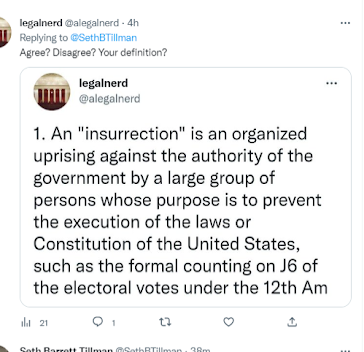I gave my equity and trusts students an assignment involving: Re Doyle (High Court of Ireland, Kenny J’s oral order was issued in open court on 15 February 1973, and his written final order was perfected on 27 April 1973) (unreported).* One of the barristers on the case was John Murray—later Attorney General (appointed, twice, by the Taoiseach, Charles Haughey), judge on the European Court of Justice (appointed by the government of Ireland), and finally, Justice, and then Chief Justice on the Supreme Court of Ireland. His obituary ran in last week’s newspapers. See The Irish Times, <https://irishtimes.com/obituaries/2023/01/28/john-murray-obituary-former-chief-justice-gave-lifetime-of-service-through-the-law/>; Independent, <https://independent.ie/irish-news/obituary-justice-john-l-murray-distinguished-former-chief-justice-and-attorney-general-known-for-his-laughter-compassion-friendship-and-wisdom-42317644.html>.
Seth Barrett Tillman, ‘Strange Coincidence: Re Doyle (High Court of Ireland, filed 1972, decided 1973),’ New Reform Club (Jan. 30, 2023, 3:40 AM), <https://reformclub.blogspot.com/2023/01/strange-coincidence.html>;
-------------------------------------------------------------------
*Our knowledge of Re Doyle comes (almost entirely) from Justice Kenny’s extrajudicial writings.
See, eg, J C W Wylie, A Casebook on Equity and Trusts in Ireland (2nd edn, Tottel Publishing Ltd 1998) 850 note 2 (citing “Re Doyle High Court, unrep, (1972 No 143 Sp)”); J C W Wylie, Irish Land Law (2nd edn, Professional Books Ltd 1986) 498, [9.072] (explaining that Re Blake “was, however, not followed by Kenny J. in Re Doyle, in which he held that, when a condition precedent attached to a gift is a violation of the donee’s constitutional rights in the Republic, the donee takes the benefit of the gift without complying with the condition”) (listing Justice Kenny as “consultant editor”); ibid note 26 (citing Re Doyle at “(1972) Unrep. (H.C., R.I.) (No. 143 Sp)”); J C W Wylie, Irish Land Law (3rd edn, Butterworths 1997) 554-55, [9.072] (explaining that Re Blake “was, however, not followed by Kenny J in Re Doyle, in which he held that, when a condition precedent attached to a gift is a violation of the donee’s constitutional rights in the Republic, the donee takes the benefit of the gift without complying with the condition”) (listing Justice Kenny as “consultant editor”); ibid 554 note 378 (citing Re Doyle at “Unrep, (HC, RI) [(]1972/143 Sp)”); J C W Wylie, Irish Land Law (4th edn, Bloomsbury Professional 2010) 615, [9.71] (same).
Chief Justice Keane reports that Justice Kenny was a “consulting editor” of Professor Wylie’s Irish Land Law “at the time . . . [Kenny’s apparent] comment [on Re Doyle] appeared [and so] it must carry considerable weight.” Ronan Keane, Equity and the Law of Trusts in Ireland (3rd edn, Bloomsbury Professional 2017) 281, [14.14]; see also ibid [14.15] (“Kenny J, answering questions raised by the executor on a construction summons, held . . . .”); ibid 281 note 24 (citing Re Doyle at “(1972, unreported), HC, Kenny J.”); ibid 281 note 25 (citing Wylie’s 4th edition’s discussion of Re Doyle).
[Professor] Hilary Biehler (formerly Delany), Equity and the Law of Trusts in Ireland (7th edn, Round Hall 2020) 502 note 9 (citing Wylie’s 4th edition’s discussion of Re Doyle). Apparently, there is no trace of Re Doyle in the court system itself, notwithstanding that this case was adjudicated by a court of record. See Irish Constitution, Article 34.3.1° (listing the High Court among other courts of record), <https://tinyurl.com/576rjmr4>; Irish Constitution, Article 34.3.2° (noting that the High Court’s “jurisdiction . . . shall extend to the question of the validity of any law having regard to the provisions of this [C]onstitution”).
Available in Irish Newspapers and Professional Journals:
‘Will Clause On Religion Rejected By Judge,’ The Irish Times (Dublin, 16 February 1973) 15;
‘Religion not legal bar to will,’ Irish Independent (Dublin, 16 February 1973) 10;
‘Religious test void in will,’ The Irish Press (Dublin, 16 February 1973) 12;
‘Condition in will unconstitutional,’ Cork Examiner (Cork, 16 February 1973) 14;
‘Stipulation on religion in will case,’ Evening Herald (Dublin, 15 February 1973) 6; and,
‘Will clause on religion rejected by judge: New Ross man’s estate for daughter’ (March 1973) 67(3) Gazette of the Law Society Ireland 59; ibid 60 (identifying case as John Rochford v Bank of Ireland Trust Company Ltd).
Later Texts where Re Doyle is discussed:
Professor J C W Wylie, A Casebook on Equity and Trusts in Ireland (Abingdon, Oxon., 1st edn, Professional Books Ltd 1985) 410 (citing “Kenny J. in Re Doyle Unrep, (1972 No. 143 Sp.)”);
J C W Wylie, Irish Land Law (London, 1st edn, Professional Books Ltd 1975) (listing Justice Kenny as “consultant editor”) 461, [9.072] (explaining that Re Blake “was, however, not followed by Kenny J. in Re Doyle, in which he held that, when a condition precedent attached to a gift is a violation of the donee’s constitutional rights in the Republic, the donee takes the benefit of the gift without complying with the condition”); ibid note 26 (citing Re Doyle at “(1972), Unrep. (H.C., R.I.) (No. 143 Sp)”);
[Chief Justice] Ronan Keane, Equity and the Law of Trusts in the Republic of Ireland (London, 1st edn, Butterworths 1988) 196-197, [14.08];
[Professor] Hilary
Delany (later Biehler), Equity and the Law of Trusts in Ireland (Dublin, 1st edn, Round Hall
Sweet & Maxwell 1996) 311, 312, 315;
Other Important Source where Re Doyle is reported:
Case file in the Central Office of the High Court (including, Kenny J’s final order perfected on 27 April 1973)—personally visited Monday, 20 February 2023 (reviewed file, including the final order, which was expressly referenced in Keane’s treatise).
-------------------------------------------------------------------
Seth Barrett Tillman, ‘Strange Coincidence: Re Doyle (High Court of Ireland, filed 1972, decided 1973),’ New Reform Club (Jan. 30, 2023, 3:40 AM), <https://reformclub.blogspot.com/2023/01/strange-coincidence.html>;

